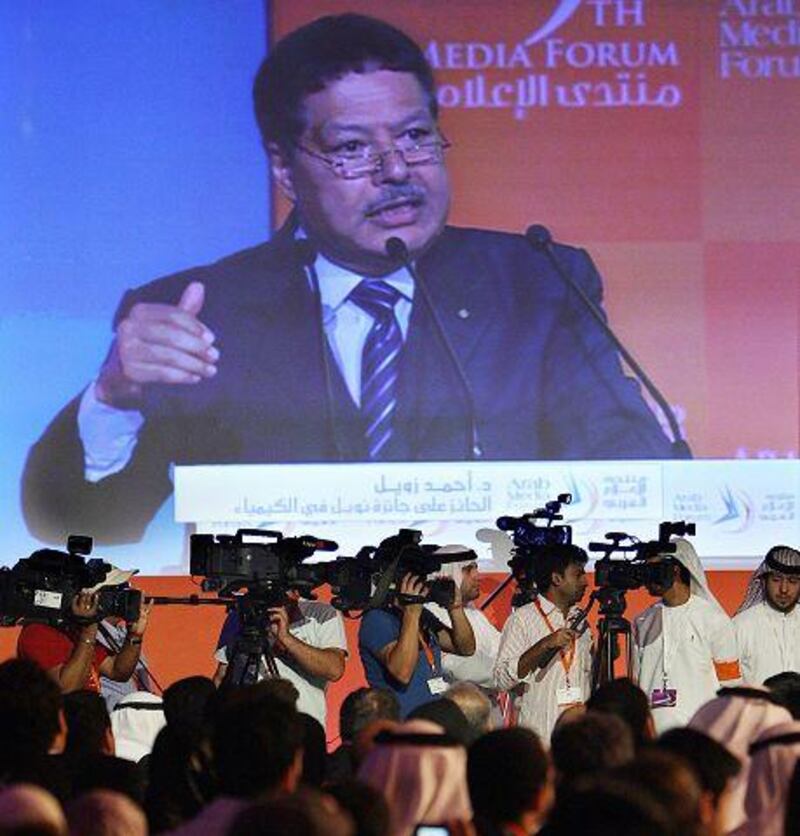DUBAI // The ninth Arab Media Forum opened with its keynote speaker, the Nobel laureate Dr Ahmad Zewail, calling for a renaissance in media and education in the region. The event, expected to draw more than 2,000 regional and international media personalities, was opened by Sheikh Mohammed bin Rashid, Vice President of the UAE and Ruler of Dubai, at the Atlantis Hotel. It will conclude tonight with Sheikh Mohammed honouring the winners of the Arab Journalism Awards at the closing ceremony.
In his address, which received a standing ovation, Dr Zewail said video was now the biggest player in the information revolution thanks to the internet, which would have serious consequences for the future of television. He also highlighted the fact that Arabic broadcasters continue to prefer quantity over quality. "There are 300 satellite channels in the Arab region and 90 per cent are entertainment," he said. The fact that almost two billion people have internet access means "even the poorest man is now connected and can see what is going in the world", and so the end of censorship might be in sight, Dr Zewail said.
"A photo taken by a mobile phone can bring down governments," he said. "I don't think that politics can stand up to the power of the media." Dr Zewail, an Egyptian who won the 1999 Nobel Prize for chemistry, lamented the regressing standard of education in the Arab world and the rising tide of illiteracy, hindering the cause of transparency. "In the 21st century, the level of illiteracy in the Arab world is 30 to 50 per cent ? and unemployment is 20 per cent," he said. He also suggested that while 45 per cent of the region's 300 million people are under the age of 14, the energy of Arab youth was not being harvested.
The opening day of the forum included a morning session on the meteoric rise of electronic and print publications in China and India. Several workshops on topics such as the rise of citizen journalism and expansion in the Kuwaiti media were also on the agenda. Speakers at the Asia Rising: The Story of China and India seminar urged Arab media organisations to expand into fast-growing Asian markets.
N Ram, the editor-in-chief of The Hindu newspaper from India, said: "Media is divided into two worlds, one where it is witnessing rapid growth and the other that is in steep decline. We are seeing the growth in emerging economies while the scenario in the western world has been described with words such as 'meltdown,' 'collapse' and 'disintegration'." His thoughts were echoed by Dilip Cherian, the consulting partner of the Indian public relations firm Perfect Relations, who said rapid commercialisation in India and China is driving the growth of media in both countries. The Indian characteristic of making inquiries is also making the nation a springboard for independent media, he said.
"India is a democracy that is in continuous dialogue with itself," Mr Cherian said. "We have a culture of asking questions." Panelists at the seminar agreed that other factors fuelling aggressive growth of the Asian media included an ever-expanding middle class armed with increasing amounts of disposable income and an insatiable appetite for information. Discussions on issues such as sports media, Arabic channels' diffidence towards expanding into other languages and the etiquette of debate on live TV were also held during the opening session.
@Email:akhaled@thenational.ae






